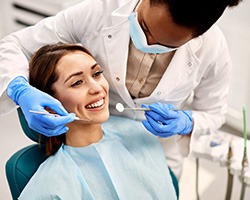
Emergency Dentist – Rolling Meadows, IL
Let Us Ease Your Worries and Restore Your Smile
There are two kinds of dental emergencies: those that occur suddenly, like a knocked-out tooth, and those that develop slowly over time, such as a severe toothache. In either case, getting immediate attention is the key to preventing a bad problem from becoming much worse. If you find yourself in a stressful dental dilemma, it’s important to have someone reliable on your side to walk you through the situation and ease your worries. That’s what we’re here to do! We want to save your tooth and keep your oral health in tip-top shape by giving you quick care that you can count on. Even in the most dire-seeming situation, you can depend on our team of dental professionals at Plum Grove Family Dental!
Why Choose Plum Grove Family Dental for Emergency Dentistry?
- Same-Day Emergency Appointments
- Available on Evenings and Weekends
- Advanced Dental Technology
How We Treat Dental Emergencies

Your grin will be in good hands if you call our office for emergency dental care. Here’s how we typically handle urgent dental issues:
- Same-Day Appointment: There’s no time to lose in a dental emergency; thus, when you call our office, we’ll often set up an appointment on the same day. To make sure your smile stays safe in the meantime, our team can give you some over-the-phone first-aid advice.
- Emergency Exam: Before we can treat your dental emergency, we have to understand what it is first. We’ll look at your teeth closely and take whatever X-rays we need. Naturally, we’ll also do what we can to reduce your pain.
- Review Findings: We’ll give you a brief overview of what we found during our examination and what can be done to address the problem. When we recommend a treatment, we’ll also give you an estimate of how much it will cost.
- Get the Care You Need: Your treatment plan might include dental crowns, root canal therapy, tooth extraction, and other procedures. Whatever your needs are, we’ll do whatever is necessary to stop your pain and maintain your oral health.
The Most Common Dental Emergencies
No matter what kind of dental emergency you have, it needs to be treated right away; waiting could lead to further problems that require more complex forms of care. Contact our office right away if you notice signs of any of the following dental health issues. The sooner your smile can be treated by an expert, the better.
Understanding the Cost of Dental Emergencies

Depending on the severity of your issue and what services you need, the cost of emergency dentistry in Rolling Meadows will vary. At Plum Grove Family Dental, we don’t want our patients to feel like they can’t get the care they need without breaking their monthly budget, which is why we happily accept dental PPO insurance plans from any provider. We also offer in-house payment plans as well as additional financing options with little to no interest. If you find yourself in a pickle, don’t hesitate to contact us! We would be more than happy to help make sure you get the high-quality care you need. Remember, it’s always better to come and see us as soon as possible so we can quickly address the problem before it worsens.
Every Dental Emergency is Different

Most dental emergency visits are not as costly as you might think. When faced with a sudden injury, the last thing you want to be thinking about is how much it will cost just to see a professional for help. Of course, if you try to put off your visit because you fear you won’t have enough to pay for it, you’re only going to put yourself at greater risk for more serious oral health problems. By scheduling an appointment with us, we can determine the severity of the problem and recommend appropriate treatment options. The most common include everything from antibiotics and dental crowns to root canal therapy and tooth extractions.
You can trust that our dental team will provide a thorough explanation as to how we plan to treat your problem area as well as how much you can expect it to cost.
Does Dental Insurance Cover Dental Emergencies?

Some dental insurance companies will agree to cover one emergency exam each year, but you’ll need to check with yours to find out if this is the case. Also, if you’ve met your deductible and you’ve yet to use much or any of your annual maximum, your insurance company may agree to pay anywhere from 50-80% of the total cost. This can all become quite overwhelming if you’re unsure how to navigate your dental insurance policy, which is why we have plenty of people who can help.
Other Options for Making Dental Emergencies Affordable

To help make sure your visit remains affordable, our emergency dentist in Rolling Meadows also offers an in-house payment plan or flexible financing with CareCredit. If you are eligible, you can qualify for a low or zero-interest payment plan. This allows you to break up the cost of your care into manageable monthly installments for a more stress-free experience.
Taking Care of Your Smile Can Save You Money

Many dental emergencies are not entirely preventable. However, if you have a toothache that has been bothering you for quite some time and it’s now causing you to experience worsening oral health problems, it may be more costly to deal with it now than it would have been if it was addressed during its early stages.
If you wait to seek help because you’re worried it will cost too much, you’ll be faced with the realization that the more extensive and complex the treatment, the higher the price. By taking proper care of your teeth and gums daily, you can reduce your risk for tooth decay, gum disease, missing teeth, bad breath, and a host of overall health issues.
Keys to Preventing Dental Emergencies

Dental emergencies aren’t completely avoidable, but there are some precautionary measures you can take to reduce your risk of experiencing them. By implementing the habits below in your daily life, you can keep your oral health in tip-top shape and possibly avoid a stressful dilemma:
Visit Your Dentist Twice a Year

The most important preventive measure you can take is to visit Dr. Wang every six months for your dental checkups and cleanings. This way, she can treat the small issues before they have a chance to progress and turn into an emergency. Your dental hygienist will also gently remove harmful substances, like plaque, in an effort to reduce your risk of tooth decay, periodontal disease, and other serious oral health issues moving forward.
Maintain Good Oral Hygiene At Home

Another important best practice is taking good care of your smile at home. The first step? Using a soft-bristled toothbrush and fluoridated toothpaste to brush your teeth twice a day. From there, incorporate other good habits, like flossing and rinsing with an antimicrobial mouthwash each evening before bed. That way, food particles, plaque, and other debris aren’t left to linger on your teeth, decreasing your chances of dental damage.
Stick to a Nutritious, Well-Balanced Diet

Something that patients often overlook is their consumption of added sugar. Although delicious, caramel-filled candies, ice cream, and other sugary snacks can negatively impact your oral health in more ways than one. That’s why we recommend opting for nutritious, well-balanced foods the majority of the time, like fresh fruits, healthy fats, and cooked vegetables. It’s also important to drink lots of water to help remove food particles from your teeth and prevent dry mouth.
Wear a Mouthguard During Sports

There’s a common misconception that you only need to wear a mouthguard if you play a contact sport, like football. The reality is that your teeth could be injured during a non-contact sport, like rollerblading, as well. So, you need to wear a mouthguard any time you’re active.
Tip: Do you grind or clench your teeth at night? Don’t wait – get an appointment with us on the calendar so we can have a custom nightguard made for you, reducing your risk of dental damage in the process.
Don’t Use Your Teeth As Tools

Be honest… If you’re having trouble opening something with your hands, do you use your teeth? Do you put your keys in your mouth when your hands are full? Do you use your teeth to remove bottle caps? If you answered “yes,” then you’re at-risk of experiencing a serious dental injury, like a crack in your enamel. So, make an effort to break bad habits like these now. It could save you from needing same-day care!
Dental Emergency FAQs

So far, you have an idea of how we treat dental emergencies, you know some important cost-related information, and you have some helpful tips on how to protect your teeth and gums from harm. But what if you still have a few questions on your mind? Then you can read on to learn the answers to FAQs about emergency dentistry!
What does chronic bad breath mean?
If there seems to be a persistent odor on your breath, it may be due to your diet. Drinking acidic beverages (like coffee) and eating pungent foods (like onions) can result in chronic bad breath, so start by adjusting what you consume. Of course, it’s also important to quit unhealthy dental habits that can negatively impact your breath, like smoking. If you’ve tried everything and nothing seems to be working, then don’t hesitate to schedule an appointment with our Rolling Meadows dental team. We’ll take X-rays and conduct an exam to determine if an untreated oral health issue is the root of the problem.
My chipped tooth doesn’t hurt. Do I still need to visit?
If your chipped tooth doesn’t hurt, then you should be safe waiting a day or two for an appointment. However, we don’t recommend going longer than that without an exam. After all, your tooth could be at risk of chipping further or developing an infection, even if you’re not in pain.
What is causing my jaw pain?
Most often, jaw pain is the result of impacted wisdom teeth, TMJ dysfunction, or chronic teeth grinding. The good news is that our Rolling Meadows dental team can help you pinpoint the root of the problem and help you find a solution! So, if your discomfort persists for more than 24 hours, it’s severe enough that you’re having trouble sleeping, or you’re experiencing other abnormal dental symptoms, like pain when biting down, call us ASAP.
Can superglue be used to repair broken dentures?
Under no circumstances should glue (or any other household adhesive) be used to repair your broken denture. In fact, even at-home denture repair kits can’t effectively restore your restoration. Ultimately, the best thing to do is get an appointment with us on the calendar and store your restoration somewhere safe in the meantime, like a small, clean container.
Should knocked-out teeth be placed in water?
Since placing your tooth in water won’t preserve the root, the answer is “no.” Instead, you should submerge it in a clean container of milk or saline solution. You can also see if the tooth will slide back into the socket without any force.
How should I sleep with tooth pain?
If you can’t come in for a same-day appointment, then you can use the following tips to help you sleep with tooth pain:
- Stick to soft foods that aren’t sugary, acidic, or spicy during dinner, like plain yogurt
- Take an OTC pain reliever about 30 minutes before bed
- Use a cold compress for 10 minutes at a time to alleviate swelling
- Keep your head elevated while you sleep by propping up a few pillows
Preventive Dentistry Restorative Dentistry Cosmetic Dentistry Advanced Services & Technology View Our Services

